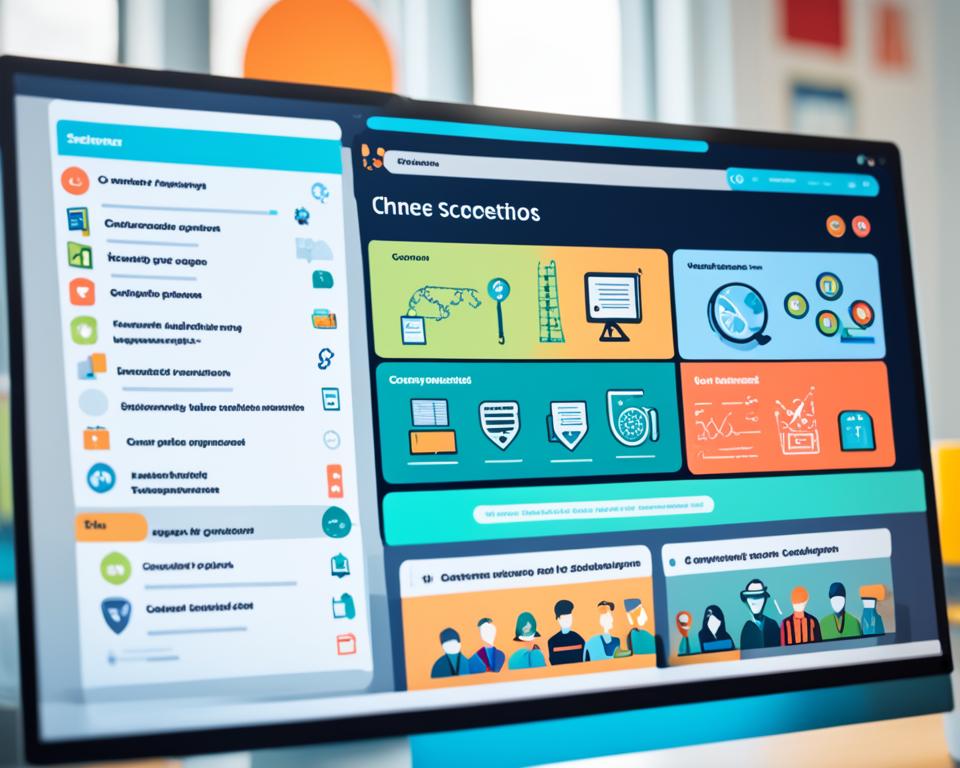Online college has become the norm, with colleges offering more online degree programs due to advancements in technology and course design. Online learning provides flexibility for students to study from anywhere and work around their schedules. Earning an online degree can open doors to employment opportunities, with a high employment rate among those with bachelor’s degrees. In 2020, millions of undergraduate students were enrolled in distance education courses online.
Key Takeaways
- Online college has become the norm, with more online degree programs available.
- Earning an online degree offers flexibility and allows students to work around their schedules.
- Online degrees can lead to employment opportunities, with a high employment rate among those with bachelor’s degrees.
- Millions of undergraduate students were enrolled in distance education courses online in 2020.
Benefits of Online Degree Programs
When it comes to pursuing higher education, online degree programs offer a range of benefits that make them an attractive option for many students. Whether you’re a working professional looking to advance your career or a busy parent juggling multiple responsibilities, online degrees provide the flexibility you need to achieve your goals.
One of the main advantages of online degree programs is the flexibility they offer. Unlike traditional on-campus programs, online courses allow you to study from anywhere and at any time that suits your schedule. This means you can balance your academic pursuits with work, family commitments, or other personal responsibilities.
However, with this freedom comes the need for strong time management skills. Online learning requires discipline and self-motivation to stay on track and complete assignments on time. You’ll need to create a study schedule that works for you and stick to it, even in the absence of regular class meetings.
Fortunately, accredited institutions recognize the unique needs of online students and provide tailored support to help you succeed. Academic advisors and support services are readily available to guide you through the online learning experience, assist with course selection, and address any challenges you may face along the way.
Studying online gives you the freedom to learn at your own pace, but it also requires a high level of self-discipline and commitment. Developing effective time management strategies and taking advantage of the personalized support offered by accredited institutions will set you up for success in your online degree program.
Key Benefits of Online Degree Programs:
- Flexibility: Study from anywhere and at any time, allowing you to balance your academic pursuits with work and personal commitments.
- Time Management Skills: Develop discipline and self-motivation to complete assignments on time and maintain a consistent study schedule.
- Tailored Support: Accredited institutions provide personalized support to help you navigate the online learning experience and succeed in your program.
Online Bachelor’s Degrees vs. On-Campus Degrees
When considering pursuing a bachelor’s degree, you may wonder whether an online program can provide the same level of employment opportunities as an on-campus degree. Rest assured, online bachelor’s degree programs offer the same employment opportunities as their traditional counterparts. Employers recognize and accept online degrees, valuing the knowledge and skills acquired through online education.
The curriculum in online bachelor’s degree programs is designed to match the curriculum of on-campus programs, ensuring that you receive the same level of education and expertise. The coursework covers the essential subjects and topics required for your chosen degree, providing a comprehensive learning experience.
While the curriculum is similar, it’s important to note that online students may need to fulfill any general education requirements if they haven’t already completed them. These requirements vary depending on the program and institution, but academic advisors are available to guide you through the process and help you navigate your degree pathway.
When pursuing an online bachelor’s degree, you have the flexibility to choose a major that aligns with your interests and career goals. Whether you opt for a liberal arts major or a more career-focused specialization, there are a wide range of options available. Academic advisors can provide valuable guidance to help you make informed decisions about your academic journey.
Benefits of Online Bachelor’s Degrees
Online bachelor’s degrees offer numerous benefits that make them a viable and convenient option for students. Here are some advantages:
- Flexibility: Online programs allow you to study at your own pace, giving you the freedom to balance your education with other personal and professional commitments.
- Convenience: You have the flexibility to access course materials and lectures from anywhere, eliminating the need to commute to a physical campus.
- Adaptability: Online programs often provide various learning resources and tools to accommodate different learning styles, ensuring that you receive a quality education tailored to your needs.
- Networking Opportunities: Through online discussions, group projects, and virtual workshops, you can establish valuable connections with professors and peers, expanding your professional network.
- Technology Skills: Online learning equips you with essential digital literacy and technology skills that are increasingly crucial in today’s job market.
By choosing an online bachelor’s degree, you can achieve your educational goals while enjoying the flexibility and convenience that online learning offers.
Online Bachelor’s Degree Options
Are you considering pursuing an online bachelor’s degree? Whether you already have an associate degree or no postsecondary education, there are various online bachelor’s programs available to suit your needs. Let’s explore the different options to help you make an informed decision.
Associate Degree Pathway
For students who have already completed an associate degree, online bachelor’s degree programs offer a seamless transition to further their education. By building upon the foundational knowledge gained in your associate degree program, you can take the next step towards earning a bachelor’s degree in your field of interest.
Competency-Based Programs
If you prefer a more flexible approach to learning, you might consider competency-based online bachelor’s programs. These programs focus on mastering specific competencies or skills rather than completing a set number of credit hours. With this approach, you can progress at your own pace and potentially accelerate your degree completion.
Accelerated Schedules
If time is of the essence and you’re looking to earn your bachelor’s degree quickly, online programs with accelerated schedules might be the right fit for you. These programs are designed to condense coursework and offer more frequent start dates, allowing you to complete your degree in a shorter period compared to traditional programs.
Pursuing a Master’s Degree Online
Already have an undergraduate degree? You can also pursue a master’s degree online to further enhance your knowledge and skills in a specific field. Online master’s degree programs offer the flexibility to balance work and other commitments while advancing in your career or pursuing a new professional path.
Whichever path you choose, an online bachelor’s or master’s degree provides the convenience and flexibility to achieve your educational goals. Embrace the opportunity to advance your career or embark on a new journey of learning and growth.
| Online Bachelor’s Degree Options | Features |
|---|---|
| Associate Degree Pathway | Seamless transition from an associate degree program to a bachelor’s degree. |
| Competency-Based Programs | Focus on mastering specific skills at your own pace. |
| Accelerated Schedules | Condensed programs allowing for quicker degree completion. |
| Pursuing a Master’s Degree Online | Advance your career or explore new professional opportunities. |

Choosing the Best Online College
When it comes to selecting an online degree program, conducting thorough research is essential to make an informed decision. Consider various factors such as accreditation, tuition, program format, and the availability of financial aid to ensure you choose the best online college that meets your needs.
Accreditation: One crucial aspect to consider is the accreditation of the online college. Accreditation ensures that the school meets rigorous quality standards and is recognized by accrediting bodies. Opting for an accredited online degree program ensures that your education holds value and is respected by employers.
Tuition: Another important factor is the cost of tuition. Compare the tuition fees of different online colleges to find a program that fits within your budget. Keep in mind that while some online programs may appear more affordable, they may not offer the same level of quality or resources as higher-priced programs. Consider your financial situation carefully when evaluating tuition costs.
Program Format: Online degree programs come in various formats, so it’s crucial to choose one that suits your learning style and preferences. Some programs are entirely online, while others may have a hybrid format that combines online and in-person components. Consider your schedule, location, and preferred mode of learning to choose the program format that works best for you.
Availability of Financial Aid: Financial aid can greatly assist in financing your online degree. Research the financial aid options available at each online college you are considering. This could include scholarships, grants, or student loans. Check the eligibility criteria for each form of financial aid and determine if you meet the requirements.
Tip: Remember to review the admission requirements and application fees for each online college you are interested in. It’s essential to understand the admission process and any associated costs before applying.
Factors to Consider when Choosing an Online College
| Factors | Considerations |
|---|---|
| Accreditation | Ensure the online college is accredited by recognized accrediting bodies. |
| Tuition | Compare tuition fees and consider your financial situation. |
| Program Format | Decide between fully online or hybrid programs based on your preferences and learning style. |
| Financial Aid | Research the availability of scholarships, grants, and loans. |
By taking the time to thoroughly research and consider these factors, you can make an informed decision when choosing the best online college for your educational journey.
Understanding Accreditation for Online Degrees
When considering an online degree program, it is essential to ensure that the program is accredited by a recognized organization. Accreditation serves as a seal of approval, vouching for the quality and rigor of the educational program.
Accreditation is a process through which a learning institution or program undergoes a comprehensive evaluation by an accrediting body to determine if it meets predefined standards. It validates that the institution or program has met or exceeded the established criteria for educational excellence.
There are two main types of accreditation: regional accreditation and national accreditation. Regional accreditation is widely recognized as the gold standard and is granted by one of six regional accrediting bodies in the United States. Regionally accredited schools typically offer a broader range of programs and have transfer agreements with other regionally accredited institutions, ensuring credit transferability is easier for students. This is particularly beneficial if a student plans to transfer credits or pursue graduate studies in the future.
National accreditation, on the other hand, is often awarded to vocational or technical institutions that focus on specific career-oriented programs. While national accreditation is valid and signifies quality education, credits earned at nationally accredited institutions may not always transfer easily to regionally accredited schools.
Employers generally prefer degrees from accredited programs, as accreditation provides assurance that the degree-holder has received a high-quality education. It is crucial to verify the accreditation status of an online degree program before enrolling to ensure that it meets the necessary standards and is recognized by employers and other educational institutions.
By choosing an accredited online degree program, students can feel confident in the value of their education and the transferability of their credits. Accreditation further strengthens the credibility of online degrees and enhances their acceptance in the job market.
Choosing an Undergraduate Major
When it comes to selecting an undergraduate major, it’s essential to consider your interests and long-term career goals. The choice you make now can have a significant impact on your future success and job prospects. While numerous options are available, certain majors tend to be more popular and lucrative than others.
Popular Undergraduate Majors
If you’re unsure where to start, some of the most popular undergraduate majors include:
- Business: A degree in business offers versatile skills that can be applied to a wide range of industries.
- Health Professions: With the growing demand for healthcare professionals, majors such as nursing or medical assisting can lead to rewarding careers.
- Social Sciences: Majors in fields like sociology or anthropology provide insights into human behavior and society.
- Biological Sciences: Students with an interest in the life sciences can pursue majors like biology or biochemistry.
- Psychology: The study of human behavior and mental processes, psychology offers opportunities in counseling, research, and more.
- Engineering: Engineering majors, particularly in disciplines like electrical or mechanical engineering, often lead to high earning potential and job stability.
While some fields may be more popular, it’s crucial to choose a major that aligns with your interests and passions. Finding a subject that excites you can lead to a more fulfilling academic journey and increase your chances of success in your chosen career path.
High-Earning Majors
If earning potential is a significant consideration, certain majors have historically led to high starting salaries. Engineering fields, in particular, are renowned for their lucrative career prospects. Disciplines like computer engineering, petroleum engineering, and chemical engineering often offer attractive salary ranges for graduates.
However, it’s important to note that high earning potential isn’t the sole factor to consider when choosing a major. It’s equally crucial to find a field that aligns with your skills, interests, and long-term professional goals. Pursuing a major that you’re passionate about can lead to greater job satisfaction and a more fulfilling career, even if the starting salary may be slightly lower.

“Choose a major that you’re passionate about, as your interests and enthusiasm will drive your success and satisfaction in your chosen field.” – [Real Name], Career Advisor
In summary, choosing an undergraduate major involves finding a balance between personal interests, career goals, and earning potential. Consider your passions, explore different fields, and seek guidance from academic advisors to make an informed decision. By selecting a major that aligns with your values and aspirations, you’ll be on the path to a rewarding and fulfilling educational journey.
Structure of Online Degree Programs
Online degree programs have a unique structure that allows students to engage in virtual classrooms and interact with their peers and instructors. Understanding the structure of online degree programs is essential for success in this mode of education.
Learning Management System
Online courses require students to access a learning management system (LMS) to access course materials, submit assignments, and engage in discussions. The LMS serves as a centralized platform where students can access all course-related information conveniently.
The image above represents a visual depiction of a learning management system, which plays a crucial role in online degree programs.
Communication Channels
Online students have a variety of communication channels at their disposal to interact with their classmates and instructors. These channels include discussion forums, social media groups, videoconferencing platforms, and email.
“The ability to communicate effectively is a vital component of online learning. Through the use of discussion forums and videoconferencing, students can engage in meaningful conversations and collaborate with their peers, fostering a sense of community within the virtual classroom.” – Prof. Jane Smith
Synchronous Class Sessions and Asynchronous Component
Online degree programs may have synchronous class sessions, where students gather in real-time to participate in live lectures or group discussions. These sessions provide an opportunity for immediate interaction and active engagement. On the other hand, online programs also have an asynchronous component, allowing students to access pre-recorded lectures and complete coursework at their own pace.
Combining synchronous sessions and an asynchronous component offers flexibility for students to balance their schedules and meet individual commitments while still actively participating in the learning process.
Overall, the structure of online degree programs enables students to access course materials, communicate with peers and instructors, and engage in real-time or self-paced learning. Embracing this structure and leveraging the available communication channels facilitate a rich and interactive online learning experience.
Best Online Bachelor’s Degree Programs
When it comes to choosing the best online bachelor’s degree program, rankings, graduation rates, faculty credentials, and support services are important factors to consider. U.S. News provides comprehensive rankings that can help prospective students make an informed decision.
These rankings take into account various factors, including graduation rates, which indicate the percentage of students who successfully complete their degree programs. This is an important measure of program effectiveness and student satisfaction.
Another key factor is faculty credentials. It’s crucial to have highly qualified and experienced instructors who can provide quality education and guidance to online students. Faculty members with advanced degrees and relevant industry experience can greatly enhance the learning experience.
Support services are also an essential aspect of an online degree program. These services can include academic advising, career counseling, technical support, and access to online resources. A strong support system can contribute to the success and well-being of students throughout their academic journey.
By exploring the rankings, prospective students can find the best online bachelor’s degree programs that align with their academic and career goals. They can compare the rankings, consider the graduation rates, faculty credentials, and support services offered by the different programs, and make an informed decision that can shape their future.
| Ranking | University | Graduation Rates | Faculty Credentials | Support Services |
|---|---|---|---|---|
| 1 | University of ABC | 93% | 85% of faculty hold advanced degrees | 24/7 technical support, career counseling |
| 2 | XYZ University | 88% | 90% of faculty have industry experience | Personalized academic advising, online library access |
| 3 | DEF College | 90% | Faculty include published researchers | Virtual tutoring, internship opportunities |
Is an Online Bachelor’s Degree Worth It?
When considering your educational pathway, it’s essential to weigh the value of an online bachelor’s degree. Rest assured, an online degree holds the same weight as an in-person degree, offering a multitude of benefits that make it a worthwhile investment.
Long-Term Earning Potential
An online bachelor’s degree equips you with the knowledge and skills needed to succeed in your chosen field. With a robust curriculum that matches its in-person counterpart, an accredited online degree enhances your earning potential over the long term. By gaining expertise in your field through rigorous online coursework, you position yourself for higher-paying job opportunities.
Job Prospects and Career Advancement
Employers value the skills and knowledge obtained through an online bachelor’s degree program. A degree from an accredited institution demonstrates your commitment to education and showcases your readiness to excel in the job market. Whether you’re seeking entry-level positions or striving for career advancement, an online degree opens doors to a wide range of job prospects and paves the way for professional growth.
Convenience and Flexibility
Online learning provides unparalleled convenience and flexibility, catering to individuals with busy schedules or personal commitments. With the flexibility to study at your own pace and access course materials from anywhere, you can seamlessly integrate education into your daily life. This flexibility allows you to balance work, family, and other commitments while pursuing your degree.
Accredited Degree
An online bachelor’s degree from an accredited institution carries the same credibility and acceptance as a traditional in-person degree. Accreditation ensures that the program meets rigorous quality standards and adheres to industry regulations. Employers recognize the value of an accredited online degree, giving you a competitive edge in the job market.
In conclusion, an online bachelor’s degree offers substantial benefits. From its potential to increase your earning power to the convenience and flexibility it provides, an online degree is a worthwhile investment in your future. By choosing the right program from an accredited institution, you can gain the knowledge and credentials needed for career success.
Popular Majors and Average Tuition Costs
When pursuing an online bachelor’s degree, it’s important to choose a major that aligns with your interests and career goals. Here are some popular majors for online students:
- Business: A business degree provides a solid foundation for various industries and can lead to diverse career opportunities.
- Computer Science: With the increasing demand for tech professionals, a degree in computer science can open doors to lucrative careers in software development, data analysis, and more.
- Education: If you’re passionate about teaching and shaping young minds, an online degree in education can help you become a certified teacher or pursue roles in education administration.
- Information Technology: An IT degree equips you with the skills to handle complex technology infrastructures and can lead to high-paying roles in cybersecurity, network administration, and IT management.
- Nursing: Online nursing programs are designed for registered nurses looking to advance their careers. A nursing degree can lead to roles in healthcare management, nursing education, and specialized nursing fields.
- Psychology: An online psychology degree can prepare you for careers in counseling, human resources, social services, or further study in psychology at the graduate level.
While the choice of major is crucial, it’s also important to consider the cost of tuition. Tuition costs for online bachelor’s degrees vary depending on several factors, including the school and your residency status. To make your education more affordable, consider the following options:
- Look for affordable online colleges that offer competitive tuition rates without compromising the quality of education.
- Explore in-state public universities that typically offer lower tuition rates for residents.
- Consider starting at a community college and then transferring to a four-year institution to save on tuition costs.
Remember, the investment you make in your education is an investment in your future. By choosing a popular major and considering more affordable options, you can pursue your desired career path through an online bachelor’s degree program.
Conclusion
Online education has revolutionized the way we pursue degrees and offers numerous benefits for career advancement and personal growth. With the flexibility provided by online degree programs, you can earn a top accredited degree while managing your work and personal commitments.
Accredited online degree programs are designed to provide the same quality education and job prospects as traditional in-person programs. Employers recognize the value of an online degree and appreciate the skills and knowledge gained through online learning.
When choosing an online college, it is essential to consider factors such as accreditation, tuition, and program offerings. Look for institutions with reputable accreditation to ensure the quality and recognition of your degree. Additionally, consider the tuition costs and financial aid options available to make an informed decision.
Online education offers the convenience and flexibility to tailor your learning experience to fit your schedule and lifestyle. Whether you’re a working professional seeking career advancement or a busy parent looking to expand your knowledge, online education provides the opportunity to achieve your educational goals.
FAQ
What are the benefits of online degree programs?
Online degree programs offer flexibility and allow students to study from anywhere and work around personal responsibilities. Online students need strong time management skills and can receive tailored support from accredited institutions.
How do online bachelor’s degrees compare to on-campus degrees?
Online bachelor’s degrees provide the same employment opportunities as on-campus degrees. The curriculum is usually comparable, and employers accept online degrees. Students may need to complete general education requirements if they haven’t already. They can choose between a liberal arts major or one that is more career-focused.
What options are available for online bachelor’s degrees?
Online bachelor’s degree programs are available for students with an associate degree or no postsecondary education. There are various options to choose from, including competency-based programs or programs with accelerated schedules. Students with an undergraduate degree can also pursue a master’s degree online.
How should I choose the best online college?
When choosing an online degree program, students should research and consider factors such as accreditation, tuition, flexibility, and availability of financial aid. It is important to ensure that the online degree program is accredited by a recognized organization and to review admission requirements and fees.
What is accreditation for online degrees?
Accreditation is important to ensure that the online degree program meets quality standards. Regional accreditation is widely recognized and facilitates credit transfer between regionally accredited schools. National accreditation is usually awarded to vocational or technical institutions. Employers often prefer degrees from accredited programs.
How should I choose an undergraduate major for an online degree?
When choosing an undergraduate major, students should consider their interests and career goals. Popular majors for online bachelor’s degrees include business, health professions, social sciences, biological sciences, psychology, and engineering. Students should choose a major based on their passion and professional goals.
What is the structure of online degree programs?
Online courses require students to log in to a learning management system, which serves as a virtual classroom. Students interact with each other through various communication channels such as discussion forums, social media, videoconferencing, and email. Some programs may have synchronous class sessions held in real-time, while others have an asynchronous component for self-paced coursework.
How can I find the best online bachelor’s degree programs?
U.S. News ranks online bachelor’s degree programs based on factors such as graduation rates, faculty credentials, and support services. Prospective students can explore these rankings to find the best online programs that meet their needs.
Is an online bachelor’s degree worth it?
Yes, an online bachelor’s degree is worth it. It provides the same education and long-term earning potential as an in-person degree. Online learning offers convenience and flexibility, with millions of students choosing online education. An accredited online bachelor’s degree holds the same value as an in-person degree and provides job prospects.
What are popular majors for online bachelor’s degrees and what are the average tuition costs?
Popular majors for online bachelor’s degrees include business, computer science, education, information technology, nursing, and psychology. Tuition costs for online bachelor’s degrees vary depending on the school and residency status. Students can choose affordable online colleges, in-state public universities, or community colleges to save on tuition.
What are the benefits of online degrees?
Online degrees offer opportunities for career advancement and provide flexibility for students. Accredited online degree programs provide the same education and job prospects as in-person programs. Students should choose an online college that meets their needs, considering factors such as accreditation, tuition, and program offerings. Online education is a convenient and flexible option for earning a degree.





